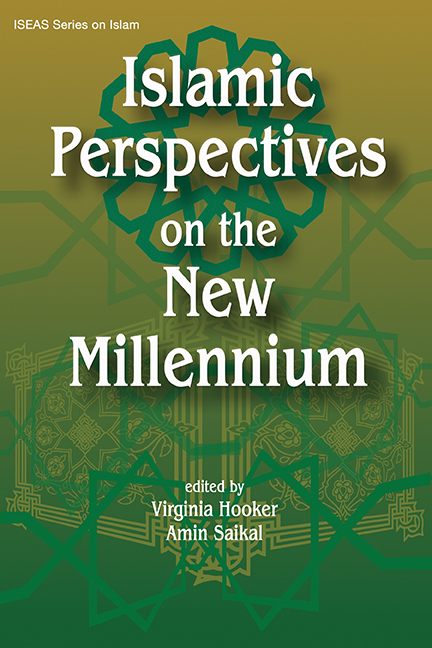Book contents
- Frontmatter
- Contents
- Acknowledgements
- Contributors
- 1 Islamic Perspectives on the New Millennium
- The New World Order
- The New Age
- 4 Islam and Globalization: Arab World Perspectives
- 5 Indonesian Muslims Enter a New Age
- The Economy
- The Nation-State
- Muslim Women
- Law and Knowledge
- Conclusion
- Glossary
- Index of Names
- Index of Subjects
4 - Islam and Globalization: Arab World Perspectives
from The New Age
Published online by Cambridge University Press: 21 October 2015
- Frontmatter
- Contents
- Acknowledgements
- Contributors
- 1 Islamic Perspectives on the New Millennium
- The New World Order
- The New Age
- 4 Islam and Globalization: Arab World Perspectives
- 5 Indonesian Muslims Enter a New Age
- The Economy
- The Nation-State
- Muslim Women
- Law and Knowledge
- Conclusion
- Glossary
- Index of Names
- Index of Subjects
Summary
It has become rather difficult to distinguish the dividing line at which American influence ends and globalization begins, whether globalization be simply a form of global Americanisation, or a genuinely independent phenomenon, although it tends to be viewed as American hegemony.
(‘Abd al-‘Aziz al-Duri, 1999).As an Islamic movement … we call [among other things] for a global democratic front against tyranny and against the suppression of peoples' freedoms, in order to have a world in which liberty is sovereign, and in which free and equitable circulation (jawalan) of benefits and ideas is facilitated.
(Rashid Ghannoushi, 1993).ISLAM AND THE DIVERSITY OF VOICES IN THE ARAB WORLD
There is no doubt that globalization, with all of the ambiguities and disconnections that it involves, has become the new grand narrative of our times, particularly in the social sciences and in the media. In attempting to appraise “Islamic perspectives” within the regional context of the Middle East, I view the “Islamic factor” as one of several factors at work in the Arab world. My approach belongs to cultural-intellectual history and sociology, rather than religious studies, economics, or realpolitik concerns. I am aware of the unfortunate tendency of many Islamists and certain Western observers to speak of Islam as if it were a changeless, closed system, inherently “unique” and remotely different from Christianity, and to view Islamic societies as antithetical to the modern values that are associated with the West. Such presentations are epistemologically unsound and tend to hinder comprehension of our common human reality. Apart from anything else, we need to remind ourselves that there are several “Islams” in our world. Islam represents not only a “civilization” and a “culture of reference” in general, but also various regional, socio-economic, and ideological “cultures”. Both Islamic teachings and history can be, and have been, interpreted in diverse ways. Contemporary Islamic movements, even within the same country, do not all share the same attitudes to such crucial issues as “religion and politics”, the role of reason, the Islamic heritage, modernity, and the “other”. We need to remember that a century or so ago, Jamal al-Din al-Afghani, Muhammad ‘Abduh, and Rashid Rida, for example, though considered as one school of thought, actually differed in their approaches to the means and orientations of Islamic reform.
- Type
- Chapter
- Information
- Islamic Perspectives on the New Millennium , pp. 43 - 73Publisher: ISEAS–Yusof Ishak InstitutePrint publication year: 2004

